 Denise Jones ’13 returned on Wednesday, October 14 to discuss her unique journey from Allegheny to the University of Michigan, where she is currently pursuing her Ph.D. in Public Health, Education, and Psychology.
Denise Jones ’13 returned on Wednesday, October 14 to discuss her unique journey from Allegheny to the University of Michigan, where she is currently pursuing her Ph.D. in Public Health, Education, and Psychology.
In her conversation, she addressed
- Her experiences as one of the only black female Economics students in the Department, and how she cultivated mentorship relationships that assisted her in pursuing work that mattered,
- How to utilize one’s Economics Degree as a means to an end, and not the end itself,
- The value of an Economics Degree in non-traditional careers,
- Why students should “resist” prescriptive career routes and think more openly and creatively about connecting one’s academic training with their passions and purposes,
- The importance of doing the “unglorified” work.
Click here to view Denise’s presentation on YouTube.
Denise Jones is an educator, scholar, student advocate, and non-profit leader with over six years of practical and professional experience. Upon graduating from Allegheny College with a degree in Economics and Black Studies, Denise set out to transform the lives of students as a classroom educator in San Antonio, Texas. There, she facilitated the learning of over 180 6th – 8th graders in the subject areas of English, Mathematics, Social Studies, and AVID.
During her time, Denise taught dedicated scholars who, despite their difficult circumstances, invested in learning and growing academically and personally. While she received great joy from her students’ growth and development, Denise recognized that she and her students’ commitment to learning were not enough to break the cycles of poverty and oppression that impeded their successes. Her frustration with the school system’s approaches to addressing inequities and disparities led Denise to pursue a master’s degree in Education Policy from Columbia University’s Teachers College (TC).
As a TC student, Denise amalgamated her practical classroom experiences with theoretical training and utilized her students’ unique stories and experiences to cogitate sustainable solutions to our educational system’s most critical problems. Denise also taught adult student learners and supported their journeys toward obtaining their general education diplomas. Beyond this, Denise worked with distinguished faculty from Columbia and NYU on research projects involving school choice, teacher evaluation, and student health.
These diverse experiences informed Denise’s graduate studies and further catalyzed her interest in
exploring out-of-school and summer-time learning, peer mentoring, and educational inequity.
Denise returned to Youth Enrichment Services (YES), where she currently serves as the Assistant
Executive Director, once she completed her master’s degree. What started out as a three-month summer
appointment turned into four years of youth engagement, student advocacy, program implementation,
strategic planning, non-profit leadership, and community-based research.
Denise’s time at YES has been extremely fulfilling as she has collaborated with partners and stakeholders to move the grassroots non-profit forward, remained actively involved in research and scholarship that has led to national and international conferences and publications – with the most recent in the After school Matters Journal – developed meaningful youth enrichment opportunities that impacted the health of local communities, increased the programming scope and budget, co-facilitated sessions empowering African scholars and female entrepreneurs in Zimbabwe, committed to the professional growth and development of her colleagues, and supported the collegiate journeys of over 30 youth.
Looking Towards the Future
While her work at YES has been extremely rewarding, Denise is ready to connect her grassroots efforts to
the academy to support youth far beyond YES. With the help of scholars at Michigan, Denise hopes to
continue testing YES’ mentorship model and building the case for how community-based practitioners can
help underserved students in out-of-school learning spaces. Denise is eager to explore how to embolden
students from inner-city, low-income communities to shift their mindsets about themselves and to look
inward in a way that connects them to their life purposes and elicits their sense of civic responsibility to their communities.
Denise is especially interested in investigating the factors that youth identify as important to navigating the craziness of their communities and to persisting through their often disturbance-ridden secondary institutions. Denise is also interested in examining the relationship between mentorship and motivation and how this effects youths’ college access and persistence. Ultimately, Denise’s work is youth-
centric and multidisciplinary in nature as it combines a host of disciplines and academic thoughts.
Denise foresees her future as a researcher pursuing solutions and strategies to ameliorate the challenges
that persist in urban communities and schools. Upon obtaining her PhD, she fully anticipates leading – and using – research to better serve youth. Her role will be that of changing lives, building wealth, and
empowering the community, as she believes the community is the unit of change – it builds the knowledge
and then informs the academy.
Denise is excited to join a unique cohort of scholars whose alliance is critical in advancing education policy issues.
This presentation is sponsored by the Womxn in Economics Club at Allegheny College. Please email womxninecon@allegheny.edu for more information.
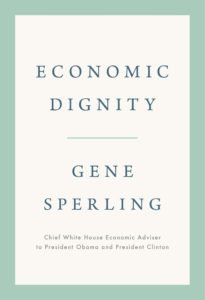 On October 29th, the Bruce R. Thompson Center for Business and Economics and Allegheny Law & Policy program welcomed Gene Sperling, Former Director, National Economic Council and Assistant to the President for Economic Policy under Presidents Clinton and Obama. He led a lively discussion of how his call for Economic Dignity has been highlighted by the COVID crisis, and how it should inform progressive policy going forward.
On October 29th, the Bruce R. Thompson Center for Business and Economics and Allegheny Law & Policy program welcomed Gene Sperling, Former Director, National Economic Council and Assistant to the President for Economic Policy under Presidents Clinton and Obama. He led a lively discussion of how his call for Economic Dignity has been highlighted by the COVID crisis, and how it should inform progressive policy going forward. The Bruce R. Thompson Center for Business & Economics welcomed Dr. Stephen Genco on Monday, November 9 to discuss persuasive marketing and his ongoing research. You can
The Bruce R. Thompson Center for Business & Economics welcomed Dr. Stephen Genco on Monday, November 9 to discuss persuasive marketing and his ongoing research. You can  The Bruce R. Thompson Center for Business & Economics welcomed Dr. Rocio Medere, Assistant Professor of Economics, Southern Methodist University on November 4. Dr. Medere is the economist who asked the research question, “Is tourism good for locals?”
The Bruce R. Thompson Center for Business & Economics welcomed Dr. Rocio Medere, Assistant Professor of Economics, Southern Methodist University on November 4. Dr. Medere is the economist who asked the research question, “Is tourism good for locals?”

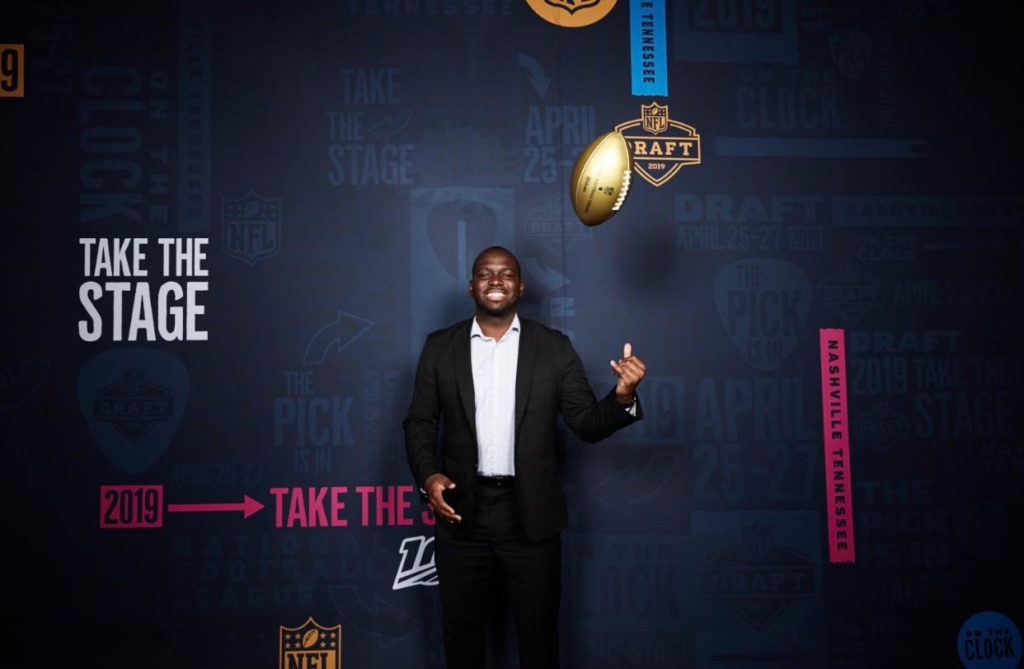
 Denise Jones ’13 returned on Wednesday, October 14 to discuss her unique journey from Allegheny to the University of Michigan, where she is currently pursuing her Ph.D. in Public Health, Education, and Psychology.
Denise Jones ’13 returned on Wednesday, October 14 to discuss her unique journey from Allegheny to the University of Michigan, where she is currently pursuing her Ph.D. in Public Health, Education, and Psychology. On October 5, the Bruce R. Thompson Center for Business and Economics welcomed John Paul Marcantonio ’01, Chief Executive Officer and Managing Director of Gale Pacific Ltd. John Paul will share his Allegheny journey and how his company has adapted during the ongoing pandemic.
On October 5, the Bruce R. Thompson Center for Business and Economics welcomed John Paul Marcantonio ’01, Chief Executive Officer and Managing Director of Gale Pacific Ltd. John Paul will share his Allegheny journey and how his company has adapted during the ongoing pandemic. 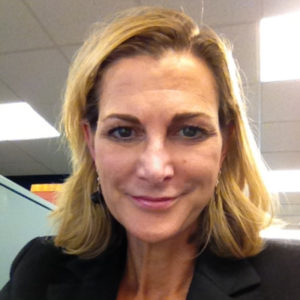 On Wednesday, October 7, Allegheny College will welcome Anne Gearan ’85, White House correspondent for The Washington Post to answer questions from both the Center for Political Participation and Center for Business & Economics Fellows concerning this year’s presidential election campaign. The Allegheny community is invited to listen in as Anne fields student questions and illuminates presidential campaign media coverage.
On Wednesday, October 7, Allegheny College will welcome Anne Gearan ’85, White House correspondent for The Washington Post to answer questions from both the Center for Political Participation and Center for Business & Economics Fellows concerning this year’s presidential election campaign. The Allegheny community is invited to listen in as Anne fields student questions and illuminates presidential campaign media coverage.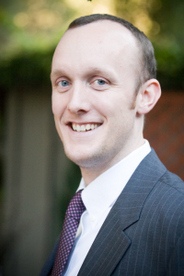 In the second lecture in this year’s theme, Seeking Justice in a Divided Nation, the Bruce R. Thompson Center for Business & Economics welcomed Dr. George Bulman, Assistant Professor of Economics, University of California, who presented his research entitled “Law Enforcement Leaders and The Racial Composition of Arrests.”
In the second lecture in this year’s theme, Seeking Justice in a Divided Nation, the Bruce R. Thompson Center for Business & Economics welcomed Dr. George Bulman, Assistant Professor of Economics, University of California, who presented his research entitled “Law Enforcement Leaders and The Racial Composition of Arrests.”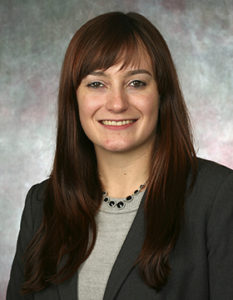 October 6, the Bruce R. Thompson Center for Business & Economics will host Julianne Dunn, Cleveland Federal Reserve Bank. “Good policy can’t be created in a vacuum, “says Julianne Dunn. She emphasizes including the real drivers of the economy—businesses and workers—to ground and inform economic policy.
October 6, the Bruce R. Thompson Center for Business & Economics will host Julianne Dunn, Cleveland Federal Reserve Bank. “Good policy can’t be created in a vacuum, “says Julianne Dunn. She emphasizes including the real drivers of the economy—businesses and workers—to ground and inform economic policy.